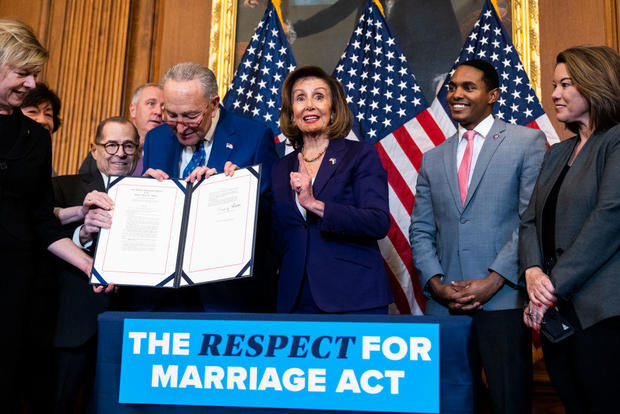The same-sex and interracial marriage protection law was approved by the House on Thursday, marking a decades-long shift in American attitudes about homosexual marriage and sending it to President Biden’s desk for his signature.
The Respect for Marriage Act, as it is known, was enacted last summer by the lower chamber with support from 47 Republicans, and it now has bipartisan support in the Democratic-controlled House. Thirty-nine Republicans joined all the Democrats in the House to approve the legislation, which passed 258 to 169, with one Republican voting “present.”
Especially in light of the Supreme Court’s decision to overturn Roe v. Wade in June, which was the impetus for Congress to take up the bill, Mr. Biden claimed that the measure’s passage will give peace of mind to LGBTQI+ and interracial couples who are now assured federal protections.
Millions of young people around the nation now have hope and dignity as they grow up knowing that their government will honor the families they create, the president said in a statement. “Congress has restored a measure of security to millions of marriages and families,” he added.
Before the Democratic Party cedes control of the lower house to the Republicans in January, the proposal is probably one of the last important legislative successes from the Democratic House and Speaker Nancy Pelosi’s final act as a speaker.
In a speech on the House floor, Pelosi said, “Today, we stand up for the values that the overwhelming majority of Americans hold dear, a belief in the dignity, beauty and divinity, divinity, spark of divinity, in every person and abiding respect for love so powerful that it binds two people together.”
The California Democrat pointed out the irony of the vote: she had repealed Don’t Ask Don’t Tell as one of her final acts as speaker during her first term, and she will now end her speakership with the Respect for Marriage Act.

After the Senate passed the bill with 61 to 36 votes, including the support of 12 Republicans, the House voted on it. After the initial House-passed bill was modified to include an amendment protecting religious liberty, the proposal received more support from GOP senators.
The work of the bipartisan coalition in Congress, Mr. Biden said, “showed that it’s possible for Democrats and Republicans to come together to preserve our most fundamental rights,” helping the marriage equality law pass both chambers.
The Respect for Marriage Act was one of the first pieces of legislation the House passed after the Supreme Court’s decision in June to scale back the right to an abortion. Democrats acted quickly to enshrine marriage equality in federal law after Justice Clarence Thomas’ concurring statement asked the court to reexamine many precedent-setting decisions, including the 2015 ruling affirming the right to same-sex marriage.
The measure repeals the Defense of Marriage Act from the Clinton administration, which barred same-sex unions from receiving federal benefits and recognition. It also protects marriages by mandating that legal unions be recognized regardless of “sex, color, ethnicity, or national origin.”
A bipartisan group in the Senate negotiated changes to the bill, guaranteeing nonprofit religious organizations won’t be required to provide services, facilities, or goods for the celebration of same-sex marriage, and protecting religious liberty and conscience protections available under the Constitution and federal law. This was done after Senate Republicans voiced concerns the original plan would infringe on religious freedom. Additionally, the bicameral amendment makes it explicit that the measure does not provide the US government the right to recognize polygamous unions.
The agreement on the amended measure was essential because it generated the Republican backing required to end a filibuster in the Senate and allow for the package’s final passage.
The approval of the measure, especially with bipartisan majorities, represents a turning point for the LGBTQ rights movement and evidence of the public’s evolving attitudes toward same-sex unions in America. According to a Gallup poll conducted in June 2021, support for gay marriage is at an all-time high.

It also illustrated how Democrats were becoming increasingly concerned that the enlarged conservative majority on the Supreme Court would jeopardize other rights protected by earlier Supreme Court rulings. The House also approved measures to guarantee access to birth control and restore abortion rights after the Supreme Court repealed Roe v. Wade in addition to the marriage equality bill. However, neither of that legislation would pass the 50–50 Senate.
Although the Defense of Marriage Act was repealed in 2013 and the Supreme Court acknowledged the right to same-sex marriage in its landmark ruling in Obergefell v. Hodges in 2015, the legislation adopted by Congress adds additional protections for marriage equality.
Republicans’ resistance in both chambers also highlights the power of the party’s firmly anti-same-sex marriage conservative base. Numerous conservative groups lobbied Republicans to oppose the plan, and Ohio Republican Rep. Jim Jordan declared on the House floor that it was the “wrong course of action.”
The number of hate crimes against Asian Americans, Jews, and LGBTQ persons has increased in certain major U.S. cities this year, despite the public’s acceptance of marriage equality. The suspect was charged with 305 criminal counts, including hate crime and murder after five people were shot dead and 17 others were injured in a shooting at an LGBTQ nightclub in Colorado Springs on Tuesday.
The marriage equality proposal gained support after it was introduced in July, but Sen. Tammy Baldwin, a Democrat from Wisconsin, and the bipartisan group of senators involved in talks over the proposal asked for the Senate to delay consideration of the proposal until after the November midterm elections.
The Senate, however, moved quickly to adopt the bill after the agreement on protecting religious liberty was approved.


